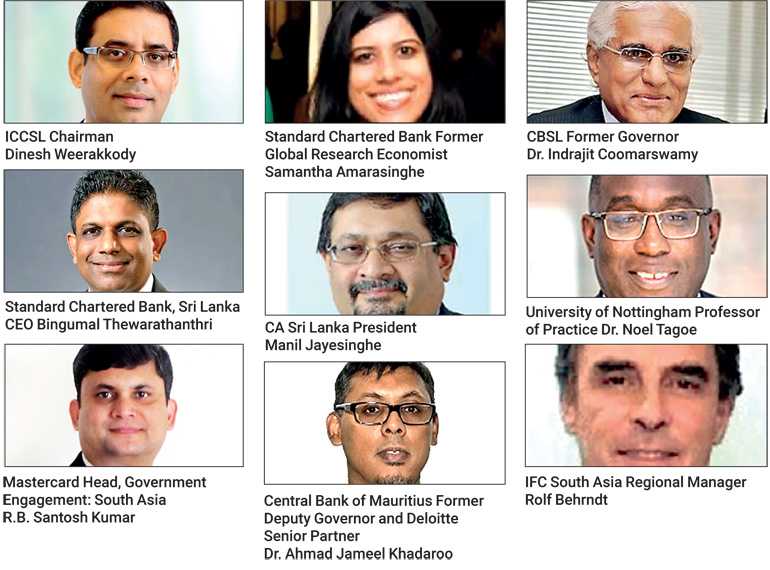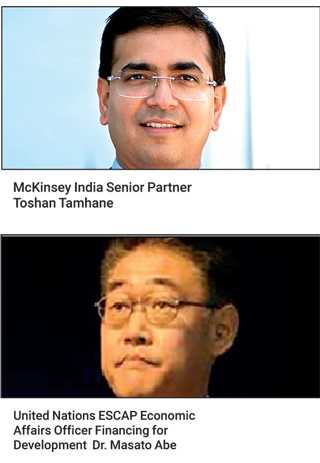Tuesday Feb 24, 2026
Tuesday Feb 24, 2026
Friday, 7 August 2020 00:00 - - {{hitsCtrl.values.hits}}

By Samantha Amerasinghe
The webinar hosted by the International Chamber of Commerce (ICC) Sri Lanka in association with the Daily FT and CIMA explored the topic ‘Towards a new resiliency in the financial system’. The session was moderated by ICCSL Chairman Dinesh Weerakkody and Standard Chartered Bank former economist Samantha Amerasinghe.
Our financial system has proved very resilient over the past 50 years. No reason to doubt it will bounce back after this crisis. The ‘bounce back’ is the unknown this time. Little of what we know, are familiar with and can deal with successfully, will be the same as before – customers, demand, value propositions, savings habits, revenue streams. An eminent panel which included Dr. Indrajit Coomaraswamy former Governor Central Bank of Sri Lanka, and a cross-section of business leaders from the banking sector, consulting firms, academia and multilateral institutions shared their invaluable insights on building resiliency in the financial system.
The panellists shed light on how businesses and countries are navigating through these challenging times, this so-called paradigm shift brought about by COVID-19. It was clear from the remarks of the panellists that resilience in the financial system is imperative to weather the storms in this era of disruption.
Opportunities and threats for the financial sector
Dr. Coomaraswamy shared his insights on the opportunities and threats for the financial sector stating that he sees two mitigating factors – first the medical aspects of the pandemic have been handled well and he expressed confidence that we should see a recovery if we are able to contain the pandemic. As the economy was not in a sound position pre-COVID, Sri Lanka will need to undertake structural reforms and have a sound medium-term macroeconomic framework in place to ensure a robust ‘bounce back’. The second mitigating factor is that 70-75% of aggregate demand is accounted for by domestic demand. In normal circumstances this would be a drag on growth but at this juncture, being insulated from the external sector is an advantage.
He also opined that banks have played a unique role in Sri Lanka, while in other countries governments and central banks have taken the lead in terms of providing fiscal stimulus to keep businesses and households afloat. In Sri Lanka, the government has played a crucial role but it has been constrained by a severe lack of fiscal space. Dr. Coomaraswamy also asserted that the fiscal constraints afflicting the country are not the responsibility of one government but the collective failure of a succession of governments over the decades. He emphasised that all banks must do the maximum to ensure that asset quality does not deteriorate to the point where solvency of banks becomes a threat. Dr. Jameel Khadaroo, former Deputy Governor at the Central Bank of Mauritius also underscored the importance of rethinking structural policies to adapt to the ‘new normal’.
Presenting the right picture to potential investors
CA President Manil Jayasinghe stressed the importance of presenting the “right picture to potential investors” in terms of impairment provisioning. He commented that the moratoriums ending in September 2020 should not impact impairment provisioning. If credit risk in banks has worsened, then provisions need to be put in place now. Banks should not “hide behind the moratorium” and subsequently have huge provisions when the moratorium ends.
What Sri Lanka needs to do after the crisis
Given the huge push globally to keep SMEs alive during this pandemic, IFC South Asia Regional Manager Rolf Behrndt highlighted that the IFC has initiated an $ 8 billion COVID fund to provide liquidity to help clients in the financial sector as a conduit to reach SMEs. Behrndt shared his thoughts on what Sri Lanka needs to do to rebound after the crisis; he asserted that Sri Lanka needs to move towards keeping value-added in manufacturing in the country and that there are opportunities in the agriculture and ICT sectors for Sri Lanka to move up the value chain in processing.
On the topic of making South Asia’s economies more resilient to climate change, Behrndt commented that the sustainable finance roadmap launched by the Central Bank of Sri Lanka has the support of the IFC and in terms of renewable energy initiatives the IFC is working in close collaboration with the Government of Sri Lanka to add 380 MW of wind and solar power to the energy grid. Dr. Coomaraswamy added that the Central Bank is working closely with the IFC on Green Finance initiatives and has made some headway with banks in terms of tapping into global and regional funds.
Policies around data governance and open banking critical for financial sector
SCB CEO Bingumal Thewarathanthri stated that he would like to see banking sector practices evolving in a post-COVID world to embrace working from home, digitisation and the introduction of a digital ID for the country as a means to real time digital onboarding and cited policies around data governance and open banking as critical for the financial sector.
Thewarathanthri asserted that the pandemic has presented banks and corporates with a great opportunity to change work practices, but that it’s imperative that they recognise the opportunity to partner with fintechs to provide value-added services to the bankable population. He also identified two critical success factors – the need for one integrated digital platform for all government payments and a cohesive approach in the banking sector with all banks working towards a common end-goal.
Reeling from the shock
On the question of what would be the ‘new normal’ for venture capital, private equity and hedge funds, McKinsey India Senior Partner Toshan Tamhane emphasised that though these firms are reeling from the shock caused by COVID-19 and are undergoing major stress in their ability to infuse new funds, they are also seeking new opportunities. Many companies are reassessing their supply chains and there has been significant interest in sectors such as pharmaceuticals, telecommunications, energy and renewables and financial services (banking and insurance).
Regulators have to grapple with creating the right framework for building stability given that from a resiliency standpoint threats to the financial sector such as cyber-attacks are often not in the country itself. He added, “Innovation and stability will have to go hand-in-hand if we are to take advantage of this paradigm shift and the opportunities it has provided.”
Mastercard India Head of Engagement Santosh Kumar commented that he has seen a shift in the manner in which people transact on e-commerce and digital platforms away from tourism and hotels and towards essential items. Many merchants are also moving to the digital ecosystem. He further stated that big tech firms are disrupting the business model with more countries moving to a cashless society.
Investment in foresight capabilities is imperative
Dr. Noel Tagoe expressed his disappointment with governments across the world as he believes they have “focused too much on saving lives and not enough on saving livelihoods.” Governments’ in his view should “see sooner, act faster”.
Dr. Tagoe stressed that investment in foresight capabilities is imperative if we are to move ahead of the curve and we have the tech tools to enable us to do so. He pointed out that there needs to be a “cultural and mindset shift” for accountants and finance professionals to embrace new technologies. Furthermore, there needs to be policy flexibility and the international community must work together. Restoring trust and confidence in institutions through humility in leadership and transparency is the key to moving forward in the ‘new normal’.
‘New normal’ unique to each country and sector
The concept of the ‘new normal’ was questioned by UNESCAP Economist Dr. Masato Abe, who stated that this phenomenon is unique to each country and sector. He stated that the ESG framework should be embedded in the political and financial systems and there needs to be greater collaboration among governments, financial institutions, businesses and SMEs to ensure that available funds are utilised in the region.
Moving to a multipolar world
Another salient point discussed by Dr. Coomaraswamy is that we are living in a world with an increased propensity for major shocks emanating from volatile capital flows, climate extremes and pandemics. We are moving to a multipolar world in which geopolitical risks have been elevated.
These major shocks translate into disruption of supply chains, international trade and technology. He opined that with all these sources of shocks becoming more prevalent, it is more difficult to deregulate the sector and said that it is “better to err on the side of caution”. He pointed out that the drive for less regulation was evident even before COVID. The argument that global standards were designed for advanced economies and are too restrictive for developing economies has now gained momentum.
Dr. Coomaraswamy also emphasised that one needs to strike a balance between embracing technological change and creating the incentives to facilitate the banking sector to become more competitive in the fintech space, while maintaining stability in the system. “Regulators need to make sure that they don’t go too fast so as to undermine the traditional banking sector,” and to avoid major disruption. Dr. Khadaroo also recognised that regulators have a critical role to play in order to maintain the balance between ensuring innovation and preserving financial stability due to the disruption caused by fintechs.
When asked, “What is the biggest constraint to achieving financial resilience?” Dr. Coomaraswamy mentioned that financial institutions need to be geared up to support their customers to deal with the following three key elements of the ‘new normal’ – digitalisation, the entire ESG agenda (not just climate change but also addressing concerns about inequality and diversity), and a less globalised, more local/regional world which will result in businesses having to deal with the trade-offs between efficiency and resilience in their supply chains. From the perspective of the payments industry, Santosh Kumar stated that the biggest constraint is anything that is a hindrance to the world moving to a digital, cashless society. Fractured regulation and the lack of investor confidence were also highlighted as constraints.
The new normal for Sri Lanka
To wrap up the session, a final question was posed to all panellists, “What will the new normal look like for businesses once the crisis is over?” Toshan Tamhane emphasised the need for creative disruption and for understanding the “new social contract,” the role of governments, corporations and talent in this new normal. Dr. Coomaraswamy summed up the session with one powerful takeaway.
He stated: “While all panellists recognise the damage the pandemic has caused, there is also an underlying optimism that we can build back better, and that’s what we need to do.”
The new normal for Sri Lanka, which we have been talking about for decades is to have a stable framework for monetary and fiscal policy and depoliticised institutions which delivers sound macroeconomic fundamentals and also a strong focus on structural reforms which will boost productivity and competitiveness of the economy.